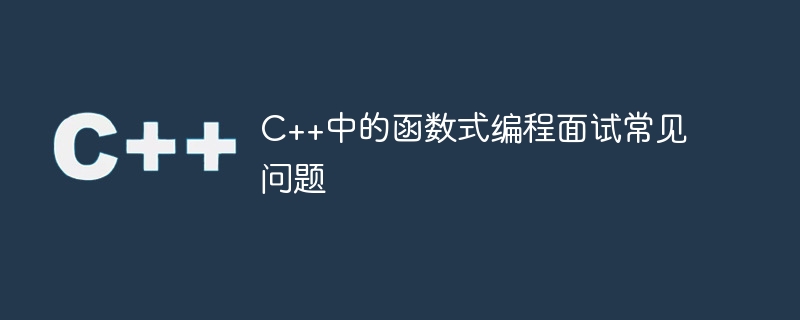Home >Backend Development >C++ >Functional Programming in C++ FAQ Interview Questions
Functional Programming in C++ FAQ Interview Questions
- 王林Original
- 2023-08-22 17:28:441791browse

With the wide application of C in the computer field and the continuous exploration of programming paradigms, functional programming has also become a topic of great concern. In C, functional programming has many special concepts and syntax, so related questions are often involved in interviews. This article summarizes and answers common functional programming interview questions in C.
1. Advantages and Disadvantages of Functional Programming
The interviewer may ask you about your understanding of the advantages and disadvantages of functional programming. Functional programming has the following advantages:
- High readability. Functional programming only focuses on the input and output of the function, without considering other factors such as internal state, so its code is usually relatively concise and easy to read.
- Reference transparent. Functional programming ignores changes in the state of variables. The return value of a function only depends on the input parameters, so the same input parameters always return the same result for a function. This property is called referential transparency.
- Easy to test. Every function in functional programming is a pure function. This function will have no side effects. As long as the input and output are correct, you can ensure that the function is correct.
However, functional programming also has the following disadvantages:
- The calculation efficiency is low. The design idea of functional programming is to decompose large and complex problems into smaller problems and solve them recursively. Although this method can greatly improve the abstraction ability and readability of the code, its efficiency is relatively low.
- The memory usage is large. Recursion and nested calls in functional programming will lead to a large number of stack levels, thereby increasing the memory footprint of the program. The same program will not have this problem in C language.
2. The difference between pure function and impure function
Pure function means that the function has no side effects, does not change the state of the input parameters, and does not rely on any external state. An impure function, on the other hand, may change the state of its input parameters or depend on external state.
The interviewer may examine the difference between these two concepts and ask how to determine whether a function is pure. To determine whether a function is a pure function, you need to consider the following points:
- Whether the function changes the parameters passed in.
- Whether the function relies on states other than the parameters passed in.
- Whether the function threw an exception.
If the function does not meet the above conditions, the function is an impure function.
3. The concept and application of higher-order functions
High-order functions refer to functions that input one or more functions as parameters, or functions that return a function. In functional programming, higher-order functions are very common.
The interviewer may examine the concepts and applications of higher-order functions and demonstrate the use of functions as parameters with examples. For example, to calculate the sum of the elements of an array, you can use the following higher-order function:
#include <algorithm>
#include <iostream>
#include <vector>
int accumulate(int v1, int v2) { return v1 + v2; }
int main() {
std::vector<int> vec{1, 2, 3, 4, 5};
std::cout << std::accumulate(vec.begin(), vec.end(), 0, accumulate);
return 0;
}The std::accumulate function in the STL library is used here, which sums the elements in the array, And accumulate the value of each item through the accumulate function.
4. The concept and application of closure
A closure refers to an entity composed of a function and the environment variables that create the function. By creating a closure, we can give a function access to variables in its execution environment.
The interviewer may examine the concept and application of closures and ask you to implement an example of using closures. For example, a closure can be implemented to sort an array:
#include <algorithm>
#include <iostream>
#include <vector>
auto less_than(int n) {
return [=](int a) { return a < n; };
}
int main() {
std::vector<int> vec{1, 2, 3, 4, 5};
std::stable_partition(vec.begin(), vec.end(), less_than(3));
for (auto& i : vec) {
std::cout << i << " ";
}
return 0;
}The std::stable_partition function in STL is used here, which can divide a sequence into two arranged order sequence. When dividing the elements of the array, divide them according to the return value of the less_than function.
Conclusion:
This article summarizes common functional programming interview questions in C and their answers. I hope it can provide some help to readers who are preparing for interviews or learning functional programming. Although functional programming is a relatively new method compared to procedural programming and object-oriented programming, its practical value cannot be ignored and is worthy of our study and in-depth study.
The above is the detailed content of Functional Programming in C++ FAQ Interview Questions. For more information, please follow other related articles on the PHP Chinese website!

